Most of us have experienced a short episode of stomach pain or diarrhea at some point in our lives.
But for some there is nothing short or fleeting about these symptoms.
Chronic (long-term) stomach pain impacts 2% of adults, while approximately 5% of adults suffer from chronic diarrhea.
This article looks into the most typical causes of these conditions and when it’s necessary to seek medical attention.
Giardia, HIV and Other Infections
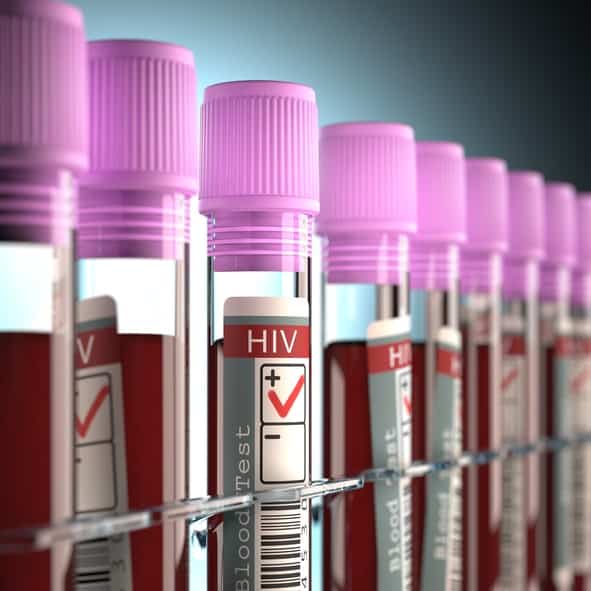
Infections are caused by microorganisms such as bacteria, viruses and parasites.
They can cause both short-term and long-term gastrointestinal (GI) symptoms, and include:
- Giardia: This waterborne parasite found in pools, hot tubs and streams is known to cause chronic stomach pain and diarrhea. Symptoms can take one to three weeks to show up and may linger for six weeks or more. For some, the issue can become long-term and trigger both irritable bowel syndrome and food allergies (1).
- HIV: This virus can also cause chronic diarrhea and abdominal pain due to an increased rate of infection and cancer (2).
- Clostridium difficile: This infection often emerges after a course of antibiotics, which kills some of the gut’s “good” bacteria. This can make way for bad bacteria like Clostridium difficile to colonize the digestive system and cause chronic diarrhea (3).
- H. pylori: this is a common and contagious bacteria which can cause gastritis and present with symptoms including stomach pain in about 20% of those infected.
Summary: Bacterial, viral and parasitic infections from Clostridium difficile, HIV, giardia and H. pylori can all result in chronic stomach pain. In some cases, long-term issues can occur.
Inflammatory and Autoimmune Conditions
Autoimmune conditions such as inflammatory bowel disease (IBD) and celiac disease are recognized causes of chronic diarrhea and abdominal pain.
Crohn’s disease and ulcerative colitis (UC) are both chronic IBD conditions in which the lining of the digestive tract becomes inflamed.
Crohn’s disease can affect the GI tract from the mouth to the rectum, while UC primarily impacts the large bowel. Abdominal pain and diarrhea (sometimes bloody) can result (4).
In celiac disease, another autoimmune condition, gut inflammation occurs from an immune response against gluten, a protein found in some grains.
The body’s immune cells not only attack the “invading” protein but also the small intestine. This can lead to an inflamed bowel that can’t properly absorb nutrients, as well as abdominal pain and diarrhea (5 , 6).
Chronic pancreatitis, often caused by alcohol abuse, can also lead to recurrent and severe abdominal pain and malabsorption-related diarrhea (7).
Summary: Celiac disease and inflammatory bowel diseases, like Crohn’s and ulcerative colitis, often cause chronic diarrhea and abdominal pain. Inflammation of the pancreas can also result in similar symptoms.
Food Intolerance and Allergies
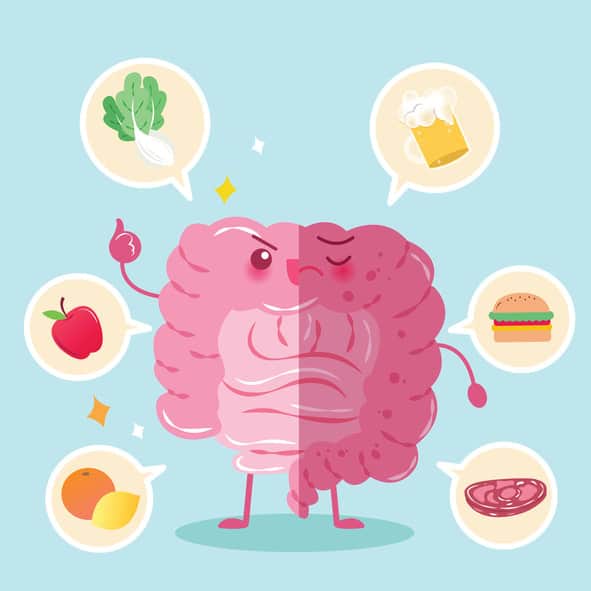
For some, certain foods can trigger abdominal symptoms such as chronic diarrhea and stomach pain.
If you have a food intolerance, your body can’t digest the food properly. If you have an allergy, an autoimmune response will occur.
Some of the most common food allergies are to wheat, protein, soy and nuts. However, not everyone with these allergies will develop diarrhea or stomach pain.
Like celiac disease, lactose intolerance can also cause chronic GI symptoms. This occurs in those who don’t have enough of the enzyme that breaks down lactose, the sugar found in milk.
As a result, lactose moves into the large intestine, where bacteria break it down, creating fluid and gas and causing pain and diarrhea.
Some people may also experience chronic diarrhea and abdominal cramping after consuming the fruit sugar, fructose, along with some artificial sweeteners (e.g., mannitol and sorbitol) (8, 9).
The majority of these compounds are collectively called FODMAPs and can be managed via a low FODMAP diet.
Summary: Both food intolerances and allergies can trigger chronic diarrhea and stomach pain. Gluten and lactose intolerance are common triggers of GI distress. Some may also have issues with fructose and artificial sweeteners.
Would you like a full list of what you can safely eat on low FODMAP diet?

Tap the blue button below to download our “Eat This, Not That” list as well as additional resources for IBS and digestive issues (it’s free!)
Malabsorption
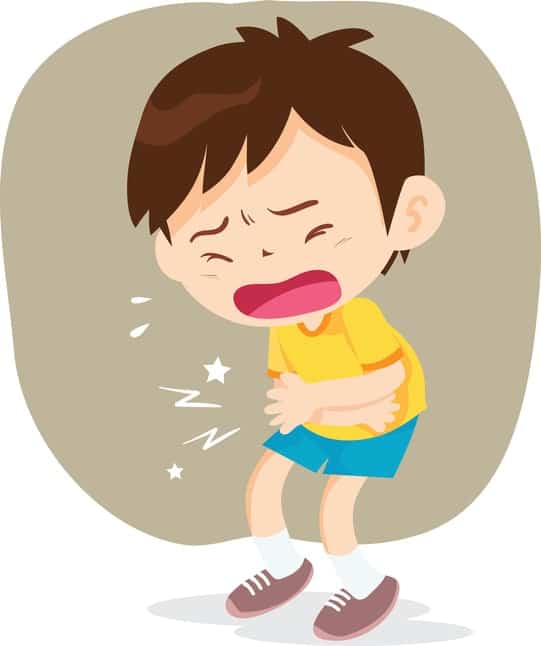
Nutrients that are not absorbed appropriately (malabsorption) can pass through the gut relatively quickly, resulting in diarrhea and abdominal pain.
An example is fat malabsorption, which can be caused from pancreatic or gallbladder dysfunction (10, 11).
There’s also a condition called bile acid malabsorption (BAM) that affects 4 to 5% of the population.
BAM develops when the GI tract doesn’t appropriately re-absorb the bile acids that help digest dietary fat. Instead, these acids proceed down the digestive tract and trigger watery diarrhea and abdominal discomfort (12).
Summary: Malabsorption of nutrients, including fat due to problems with the pancreas or gallbladder, can cause both diarrhea and abdominal pain. Another condition called bile acid malabsorption can trigger chronic diarrhea.
Gynecological Conditions
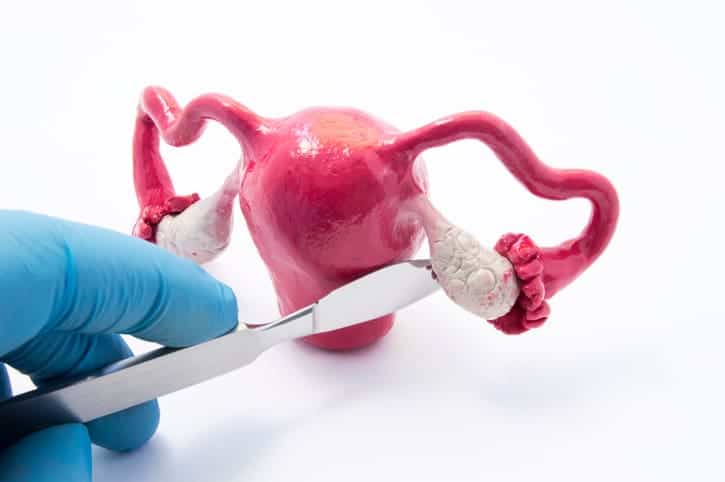
Certain gynecological conditions can cause ongoing abdominal pain and abnormal bowel habits.
Both premenstrual syndrome (PMS) and endometriosis may lead to abdominal cramps or diarrhea (13).
Fibroids may also cause stomach pain and a change in bowel habits including constipation, diarrhea or bloating (14).
Summary: Several gynecological conditions including endometriosis, fibroids and PMS can result in chronic diarrhea and stomach pain.
Medications

Many medications can cause chronic stomach pain and diarrhea, including the following types:
- Antibiotics: About 10 to 15% of hospitalized patients taking antibiotics, like clindamycin, will develop diarrhea.
- Non-steroidal anti-inflammatory drugs (NSAIDs): Commonly used to treat arthritis-related pain, this class of drugs is known to cause GI side effects including heartburn and diarrhea (15).
- Chemotherapeutic drugs: Along with abdominal pain, it’s estimated that up to 80% of patients will experience chemotherapy-induced diarrhea (16).
- Opioids: Although opioids are typically associated with constipation, some patients will develop chronic diarrhea (17).
- Laxatives: Diarrhea can result from laxative abuse. This can turn life-threatening, as diarrhea depletes the body of the minerals necessary for normal heart function (18,19).
Summary: Medications including antibiotics, non-steroidal anti-inflammatory drugs (NSAIDs), chemotherapeutic drugs, opioids and laxatives can cause a variety of gastrointestinal side effects. If you’re suffering from chronic diarrhea or stomach pain, talk to your doctor or pharmacist to determine if your symptoms are a result of your medications.
Other Major Causes and Conditions
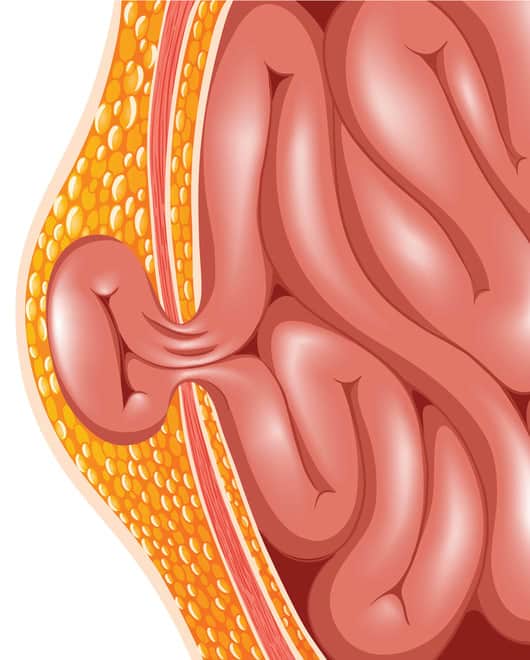
There are a number of other conditions that can result in chronic stomach pain and diarrhea.
Hernias
A hernia can cause constipation if the bowel becomes kinked.
In some cases, liquid stool will pass around the area of constipation, resulting in “overflow” diarrhea (20, 21).
Irritable Bowel Syndrome (IBS)
It’s not known for certain what causes IBS, but gut bacteria, the nervous system and hormones may all play a role.
Symptoms of IBS include stomach pain and abnormal bowel habits. In nearly one-third of IBS cases, diarrhea is the predominant symptom (22).
Liver Disease
Liver disease, most often a result of alcohol abuse or infectious hepatitis, may cause abdominal pain, nausea, vomiting and altered bowel habits.
It can also lead to fat malabsorption and diarrhea, the latter of which is also a symptom of end-stage liver disease (also called liver failure).
Excessive Alcohol Use
Chronic and excessive alcohol use can cause vital organs such as the pancreas, liver and bowels to become inflamed, bringing about abdominal pain and abnormal bowel movements.
Excessive alcohol also damages the lining of the digestive tract, which can trigger malabsorption diarrhea. (23).
Diabetes
The high blood sugar levels seen in diabetes can impair the function of GI nerves and muscles, leading to chronic diarrhea and abdominal pain (24, 25).
Cancer
Certain types of cancer can cause abdominal pain and diarrhea, including lymphoma, pancreatic, gallbladder, ovarian and colon cancer (26).
Post-Surgical
Gastric bypass surgery can result in the dumping syndrome.
This condition is a result of eating certain foods that are poorly tolerated after gastric bypass. The food moves rapidly through the digestive system, causing abdominal cramping and diarrhea.
Stress and Anxiety
The body can react to stress by developing GI symptoms like a sore stomach and altered bowel habits (27, 28).
Practices like mindfulness meditation are the most well-researched alternative therapies.
Medically Unexplained Abdominal Pain
Somatoform symptom disorder (SSD) is a psychiatric illness that can present with chronic GI symptoms including abdominal pain and abnormal bowel movements.
In SSD, the physical symptoms cannot be fully explained by an underlying medical illness. This condition is also sometimes referred to as functional abdominal pain (29).
Summary: Cancer, hernias, alcohol abuse and stress and anxiety are some of the other possible causes of chronic stomach pain and diarrhea. Determining the exact cause will require a trip to a healthcare professional.
When Should You Be Concerned?
Stomach cramps and diarrhea can be mild, fleeting and require no treatment.
However, if they’re accompanied by one of the following symptoms, it’s important to seek medical attention:
- Significant weight loss
- Diarrhea that persists for more than two days
- Severe pain
- Extreme fatigue
- High fever or chronic low-grade fever
- Chest, neck, jaw or arm pain
- Racing heartbeat
- Night sweats
- Swelling of the abdomen
- Bloody diarrhea
- Pus in the stool
- Black, tarry stools
- Signs of dehydration (particularly in children, elderly and the immunocompromised)
Summary: When stomach pain or diarrhea is accompanied by signs of dehydration, significant weight loss or other serious medical conditions, it’s important to seek medical attention.
What to Do If You’re Experiencing Chronic Stomach Pain or Diarrhea
Stomach pain and diarrhea are often short-lived and require no special treatment.
However, there is a long list of medical conditions and medications that can cause GI symptoms to last for weeks.
These include infections, inflammatory or autoimmune conditions, food sensitivities or allergies, diabetes, cancer, liver disease, stress and anxiety, and medications like NSAIDs and antibiotics.
Because there are many different reasons for chronic stomach pain and diarrhea, it’s important to check with a healthcare provider to detect an underlying cause.
Knowing the root of your symptoms will lead to an effective treatment and some much needed relief.
Would you like a full list of what you can safely eat on low FODMAP diet?

Tap the blue button below to download our “Eat This, Not That” list as well as additional resources for IBS and digestive issues (it’s free!)
